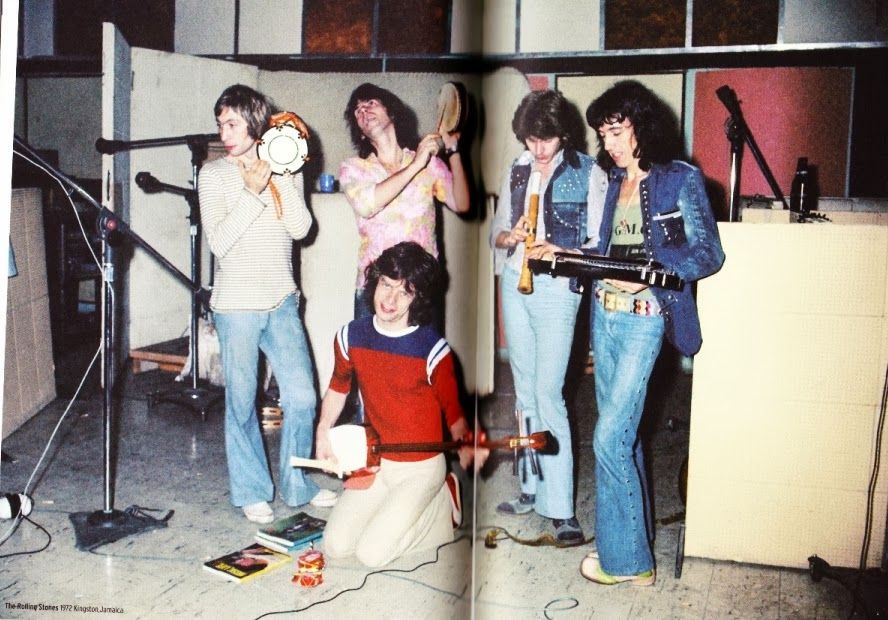
Mick Jagger got a call from his label recently with some news: While working on a reissue of the Rolling Stones’ 1973 album Goats Head Soup, the crew found some unreleased tracks. “I remember thinking, ‘Oh, no,’” Jagger says. “Unreleased tracks, to me that always means a lot of work. It’s like, ‘Things that you didn’t like and didn’t finish!’”
Excerpt from Rolling Stone to the read the full article click here.
“While I was in the clinic, Anita was down the road having our daughter, Angela,” he wrote. “Once I came out of the usual trauma, I had a guitar with me and I wrote ‘Angie’ in an afternoon, sitting in bed because I could finally move my fingers and put them in the right place again, and I didn’t feel like I had to s— the bed or climb the walls or feel manic anymore.”
The name of the song came out of nowhere. “I just went, ‘Angie, Angie,'” he recalled. “It was not about any particular person; it was a name, like oh, Diana.”
“I didn’t know Angela was going to be called Angela when I wrote ‘Angie,'” he revealed. He added he wasn’t even aware their child was going to be a girl. Angela was initially named Dandelion; however, she was born in a Catholic hospital and the people there insisted she should have a name that was more “proper.”
Goats Head Soup emerged from a period of deep uncertainty for the Stones. After their successful tour for Exile on Main Street, they’d splintered across the world; a few months later, in late 1972, they reconvened in Kingston, Jamaica, to cut a set of dark grooves that sounded like nothing they’d ever released. There were drony experiments (“Can You Hear the Music?”), strung-out ballads (“Coming Down Again”), and snarling rockers (“Dancing With Mr. D”). Critics didn’t like it at the time, and the Stones quickly dropped many of the songs from their live set. “It’s not an album that’s revered as much as Exile on Main Street in people’s minds,” says Jagger. “I suppose including me.”
Jagger knew “Angie” was a hit as soon as he heard it while visiting Richards in Switzerland, where he’d arrived with his own set of songs. After a decade of close collaboration, Jagger and Richards were living in separate countries.
Richards had fled Nellcôte, his home in the South of France, due to a drug bust; the bandmates’ U.S. visas had expired; and they could no longer live in England due to tax issues. “When we cut Exile, we were still in each other’s pockets,” Richards says. “By the time of Goats Head, Mick had married Bianca. Charlie was living in France. In other words, we had become exiles. We were all over the place. Mick and I had to learn to write stuff apart.”
They chose to record in Jamaica in part because “it was one of the few places that would let us in,” Richards says, not entirely kidding. With Billy Preston joining them on piano, the band “worked like maniacs” from midnight to 10 a.m., says Richards.
Jagger jokes that the Stones may be the only band to make an album in Jamaica with “not the slightest influence of reggae on any of the tracks.” Instead, he notes the funky combination of Richards’ and Mick Taylor’s guitars with Preston’s electric piano: “The fashion at that time was playing that clavinet with the wah-wah stuff,” he says. “It’s not Herbie Hancock, but it gives it that certain push.”
The sessions had a spontaneous feel: “A lot of tracks weren’t worked out much before we got in there,” Richards adds. “Some of them are maybe an hour old.” One of his favorite songs is “Winter,” which he calls “a Mick beauty.” Jagger wrote the song about missing a lover while stuck in the countryside. Taylor, who left the band a year later, provides a searing, melodic solo. “I always liked the way Mick picked out those pretty melodies around the tunes,” Jagger says. “He was very good at that sort of thing.”
The next summer, when Goats Head came out, “Angie” went to Number One, putting the Stones back on the charts alongside David Bowie and Elton John. Jagger told Rolling Stone at the time that the new album was more focused than Exile, but he won’t go that far today. “I say stupid things like that when I’m promoting albums,” he says now. “You gotta take that with a pinch of salt.”
Richards sees Goats Head as the beginning to an important chapter in his life, when he fell in love with Jamaica. “That was ’73, the year Marley and the Wailers put out Catch a Fire. That’s also the year the soundtrack of The Harder They Come came out. I remember being in Jamaica, there was a feeling in the air. Jamaica was starting to make a mark on the map. After the sessions, I just moved back and I stayed there for months.
